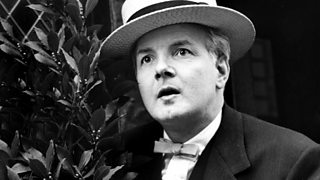Whatever happened to seaside orchestras?
"Performances daily!" A Wagner overture at the end of the Pier followed by a Gilbert and Sullivan selection on the bandstand – it’s a fantasy made real by musicians at the seaside, writes conductor Tom Higgins.
The Victorians gave us the seaside holiday and – being Victorians – ensured that, courtesy of the local municipality, music was an essential part of the experience.
In time British holiday-makers not only had a huge choice of where to go, but having arrived found there was an equally huge variety of music to entertain them.
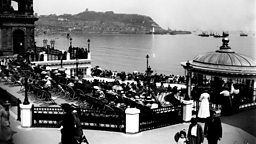
-
![]()
The Last Seaside Orchestra
Conductor Matthew Rowe explores the enduring appeal of the Scarborough Spa Orchestra, drawing the crowds since 1912.
Around the shores of Britain seaside towns tempted visitors with promises of stunning weather, comfortable hotels and a short walk to the beach. Running down the East Coast, along the English Channel and up past Wales and the Irish Sea, there were numerous destinations, many offering the added attraction of a resident orchestra. Not to be left out, Britain’s spa towns also recognised the pulling power of live music.
Seaside concerts reached their zenith between the two World Wars. Eastbourne bandstand was opened in 1935 and, similar to many others, occupies a prominent place on the seafront. For performances indoors there were venues with enticing names such as "The Pavilion" or "Winter Gardens".
And as venues varied, so did the size of orchestras. As a starting point, around 10 to 12 players could have been a typical ensemble: a handful of strings, a sprinkling of woodwind and brass and, importantly, piano and percussion. Most light music arrangements provided what was called a piano score showing all the orchestral lines. It enabled the pianist to cue in any missing instruments.
Small, but artistically formed, the ensemble gave its public contemporary easy listening and there was no bar to the range of repertoire. Increasingly, during the first half of the 20th century, British light music found willing audiences. The era when it was thought that only Europe could supply charming operettas, seductive waltzes and imaginative incidental items was long gone.
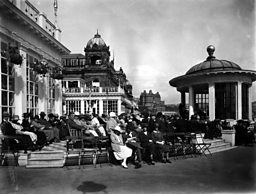
A great help in this department came from native composers such as Edward German with the dances from his comic operas, Haydn Wood and his rhapsodies, and Eric Coates, whose marches and suites struck an especially patriotic tone. Equally popular was Albert Ketèlbey who produced a quantity of miscellaneous items among which, In A Persian Market was a long time favourite. Deck-chair audiences could look forward to all this including waltzes by Johann Strauss ll, and a popular overture or two.
Soon the nation’s leading performers in light music also became part of summer seasons. Enormously popular in his day, Reginald King was a pianist and composer. He was particularly successful with his light music ensembles, appearing at fashionable London restaurants and making countless ������̳ broadcasts. Post World War ll he and his orchestra were often engaged at the Spa Pavilion, Whitby and the Floral Pavilion, Bridlington. His compositions embraced the contemporary fashion for "descriptive" items. Creating his own signature tune, he called it Song of Paradise.
Pre World War ll and on a larger scale, some seaside and spa municipalities additionally offered an orchestra which gave symphony concerts. A sometime overlooked by-product of these orchestras was that they helped launch the careers of conductors bound for later fame. During the 1920s, Basil Cameron was conductor of the Hastings Municipal Orchestra and after appointments in the United States of America returned to Britain to become a regular member of the ������̳ Proms conducting team. In the 1920s, a young Malcolm Sargent was associated with Llandudno, and Granville Bantock, appointed conductor of the New Brighton Tower Concerts in 1897, went on to became an influential figure in British music.
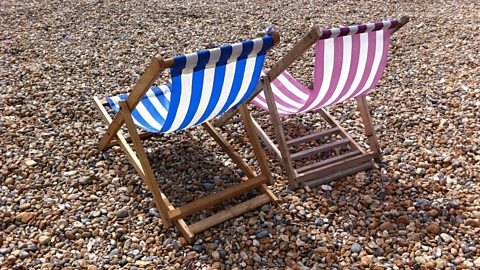
Why do we like to be beside the seaside?
What makes the seaside so special?
From Victorian retreats to the heady days of holiday camps, why do we like to be beside the sea? ������̳ Archive video made with Kathryn Ferry, writer and historian of architecture, design and seaside culture.
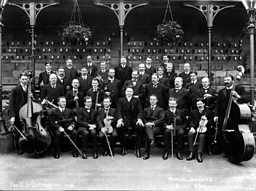
Beyond that, Dan Godfrey (later Sir Dan Godfrey), proved to be the municipal conductor who had lasting influence on his place of work, remaining in post for over 40 years.
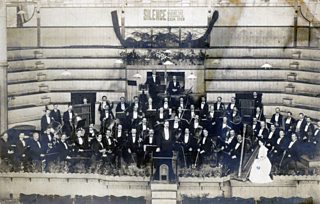
He was appointed Resident Musical Director of Bournemouth in the mid 1890s, but despite becoming a conductor of national significance, chose to remain in Bournemouth for the rest of his life.
At first he was given a military band to conduct. Some of its members, "doubled" on stringed instruments, allowing a small orchestra to play in the Winter Gardens Pavilion while the remainder played on the Pier as a wind band.
"Such was the humble beginning of the Bournemouth Municipal Orchestra," he recalled later. Admirably, Godfrey’s stance was to pursue the establishment of that orchestra, while maintaining provision for light music. Happily, his legacy in Bournemouth endures, but in many other parts of Britain, resident spa and seaside orchestras suffered a slow demise. Reflecting the fate of seaside resorts themselves, orchestras were also the victims of the advent of cheap foreign package travel in the 1960s.
In the way of the world, such a disappearance represents more than a loss of employment. Coupled to this was the loss of opportunities it gave to young instrumentalists. Clarinettist Howard Rogerson, who early in his career undertook a summer season in Torquay, remembers that "Having to give daily concerts was an invaluable experience for a young professional." At this distance in time it is still possible to say that hearing Britain and the world’s rich light music heritage at a seaside concert led many people on to discovering its classical counterpart.
Listen to The Last Seaside Orchestra on ������̳ Radio 4 Extra.
Summers past and present on Radio 4 Extra
-
![]()
Dive into Summer
A collection of programmes and features celebrating the Summer months.
-
![]()
Jerome K Jerome – Three Men in a Boat
J, Harris and George holiday on the Thames. Stars Kenneth Horne, Leslie Phillips and Hubert Gregg. 1962 musical adaptation.
-
![]()
British Summer Time Begins by Ysenda Maxtone-Graham
An entertaining and sometimes wistful chronicle of British school holidays. Read by Fenella Woolgar.
-
![]()
Summer Taste: Italian Ice Cream
Author Charlotte Mendelson recounts her long-term passion for raspberry sorbet and chocolate ice cream.


